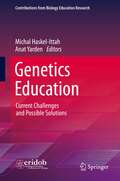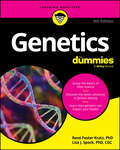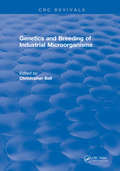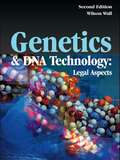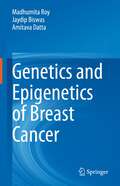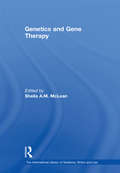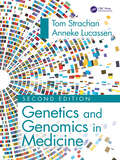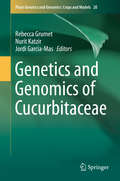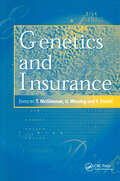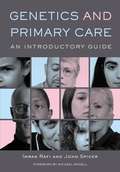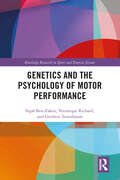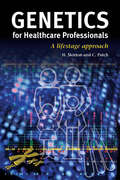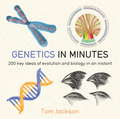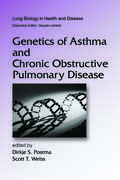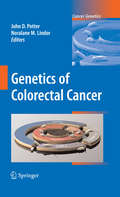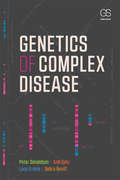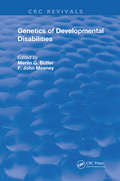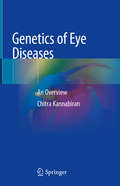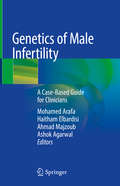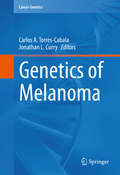- Table View
- List View
Genetically Modified and other Innovative Vector Control Technologies: Eco-bio-social Considerations for Safe Application
by Brij Kishore TyagiThis book comprehensively covers the latest development in developing and deploying the genetically modified vectors, particularly Anopheles and Aedes mosquitoes responsible for transmitting malaria parasites and dengue viruses, the most deadly and/or debilitating among all the vector-borne diseases. It is considered timely and commensurate to bring about a book dealing with the various ecological, biological and social as well as regulatory aspects for the deployment of genetically modified vectors in special context with the biosafety of humans, his associates, and the environment. Written by an array of specialists and experts in various subjects of genetically modified organisms, this book centrally addresses the (i) basic principles of the genetic manipulation of vectors and they are potential impact on human and the environment, (ii) ecological, biological, ethical, legal and social implications of the use of genetically modified vectors, (iii) identification of potential hazards; assessment and management of risks for human and environment; risk/benefit analysis, (iv) principles and practices for the assessment and management of biosecurity and biosafety in laboratories (and in the field), (v) guiding principles for creation and management of institutional or national biosafety review boards and ethics review committees, and (vi) development and application of a biosafety regulatory framework and its related legal principles at national levels for securing the development and use of vector control methods based on genetic modification strategies. This publication will be useful to researchers, scientists, and professionals engaged in academic and research institutions, government or non-government, as well as students in universities and medical colleges.
Genetics Education: Current Challenges and Possible Solutions (Contributions from Biology Education Research)
by Anat Yarden Michal Haskel-IttahThis edited volume presents the current state of the art of genetics education and the challenges it holds for teaching as well as for learning. It addresses topics such as how genetics should be taught in order to provide students with a wide and connected view of the field. It gives in-depth aspects that should be considered for teaching genetics and the effect on the student’s understanding. This book provides novel ideas for biology teachers, curriculum developers and researchers on how to confront the presented challenges in a way that may enable them to advance genetics education in the 21st century. It reviews the complexity of teaching and learning genetics, largely overlooked by biology textbooks and classroom instruction. It composes a crucial component of scientific literacy.
Genetics For Dummies
by Rene Fester Kratz Lisa SpockEvolve your knowledge of the fast-moving world of genetic research Genetics For Dummies shines a light on the fascinating field of genetics, helping you gain a greater understanding of how genetics factors into everyday life. Perfect as a supplement to a genetics course or as an intro for the curious, this book is packed with easy-to-understand explanations of the key concepts, including an overview of cell biology. You’ll also find tons of coverage of recent discoveries in the field, plus info on how genetics can affect your health and wellbeing. Whole-genome sequencing, genetic disease treatments, exploring your ancestry, non-invasive prenatal testing—it’s all here, in the friendly and relatable Dummies style you love. Grasp the basics of cell biology and get a primer on the field of genetic research Discover what you can learn about yourself, thanks to advances in genetic testing Learn how your genes influence your health and wellbeing, today and as you age Follow along with your college-level genetics course—or refresh your knowledge—with clear explanations of complex ideasGenetics For Dummies is great for students of the biological sciences, and for the genetically curious everywhere.
Genetics Meets Metabolomics
by Karsten SuhreThis book is written by leading researchers in the fields about the intersection of genetics and metabolomics which can lead to more comprehensive studies of inborn variation of metabolism.
Genetics and Breeding of Industrial Microorganisms
by Christopher BallThis text provides a clear exposition of genetic principles and problems with comprehensive, up-to-date references. Specialists who have collaborated closely with industry give an inside authentic view of the genetics and breeding of industrial microorganisms such as yeasts, filamentous fungi, actinomycetes, pseudomonads, and other bacteria of major industrial significance. This book will be especially valuable to many professionals in the field of microbial genetics.
Genetics and DNA Technology: Legal Aspects
by Wilson WallFirst published in 2005. Routledge is an imprint of Taylor & Francis, an informa company.
Genetics and Epigenetics of Breast Cancer
by Amitava Datta Madhumita Roy Jaydip BiswasThis book discusses the contribution of genetics and epigenetics alterations in the initiation, development, and recurrence of breast cancer. It also reviews the potential of translating the epigenetic alterations into diagnosis, prognosis, and breast cancer therapy. The initial chapters explore the epigenetics, etiology, and conventional treatment strategies for breast cancer. The subsequent chapters discuss the genetic landscape and cover three main epigenetic modulation mechanisms; histone modification, DNA methylation, and miRNA silencing. Further, the book explores the potential of epigenetic drugs in treating breast cancer. Lastly, it covers the phytochemicals targeting epigenetic modulators in breast cancer treatment. This book is an essential source for researchers and practitioners interested in exploring the potential of epigenetics modulators in breast cancer treatment.
Genetics and Gene Therapy (The International Library of Medicine, Ethics and Law)
by Sheila A.M. McLeanGenetics and Gene Therapy shows the wide range of the debate and the very real significance that genetics and its associated developments have for human beings, individually and collectively. Few areas of science and medicine have resulted in the volume of academic and popular literature as has genetics. The so-called revolution in understanding of the causes of disease states, and even behavioural traits, has focussed public attention on the influence of genes in making us what we are. Rapidly, however, the potential benefits of such understanding were overtaken, in the public mind at least, by the question of the possible (negative) implications of genetic knowledge and associated technologies. The chapters in this volume show just how wide-ranging concern has become, ranging from regulation to cloning, with the fear of discrimination in between. Part One begins with a range of general discussions of about the genetic enterprise itself, followed by consideration of some specific questions. Part Two then addresses cutting edge debates in genetics.
Genetics and Genomics in Medicine
by Tom Strachan Anneke LucassenThe second edition of this textbook written for undergraduate students, graduate students and medical researchers, Genetics and Genomics in Medicine explains the science behind the uses of genetics and genomics in medicine today, and how it is being applied.Maintaining the features that made the first edition so popular, this second edition has been thoroughly updated in line with the latest developments in the field. DNA technologies are explained, with emphasis on the modern techniques that are revolutionizing the use of genetic information in medicine and indicating the role of genetics in common diseases. Epigenetics and non-coding RNA are covered in-depth as are genetic approaches to treatment and prevention, including pharmacogenomics, genetic testing, and personalized medicine. A dedicated chapter charts the latest insights into the molecular basis of cancers, cancer genomics and novel approaches to cancer detection. Coverage of genetic testing at the level of genes, chromosomes and genomes has been significantly expanded and updated. Extra prominence has been given to additional genomic analyses, ethical aspects, and novel therapeutic approaches. Various case studies illustrate selected clinical applications.Key Features Comprehensive and integrated account of how genetics and genomics affect the entire spectrum of human health and disease Exquisite artwork illuminates the key concepts and mechanisms Summary points at the end of each chapter help to consolidate learning For each chapter, an abundance of further reading to help provide the reader with direction for further study Inclusive online question bank to test understanding Standard boxes summarizing certain key principles in genetics Clinical boxes summarizing selected case studies, pathogenesis mechanisms or novel therapies for selected diseases This book is equally suited for newcomers to the field as well as for engineers and scientists that have basic knowledge in this field but are interested in obtaining more information about specific future applications..
Genetics and Genomics of Cucurbitaceae
by Jordi Garcia-Mas Rebecca Grumet Nurit KatzirThis book provides an overview of the current state of knowledge of the genetics and genomics of the agriculturally important Cucurbitaceae plant family, which includes crops such as watermelon, melon, cucumber, summer and winter squashes, pumpkins, and gourds. Recent years have resulted in tremendous increases in our knowledge of these species due to large scale genomic and transcriptomic studies and production of draft genomes for the four major species, Citrullus lanatus, Cucumis melo, Cucumis sativus, and Cucurbita spp. This text examines genetic resources and structural and functional genomics for each species group and across species groups. In addition, it explores genomic-informed understanding and commonalities in cucurbit biology with respect to vegetative growth, floral development and sex expression, fruit growth and development, and important fruit quality traits.
Genetics and Insurance
by T. McGleenan U. Wiesing F. EwaldCompiled by a well known and respected team of editors and contributors from interdisciplinary backgrounds, this book has its origins in the Euroscreen project, a research project funded by the European Commission to examine the legal and ethical issues arising from the use of genetic testing and screening since 1990. Contributors from members of a sub-group look at the likely impact of genetic testing on insurance.It will be published at a point when the significant controversy surrounding this issue will have intensified throughout the European Union. Although taking a European perspective, it addresses US issues where there is a strong interest in comparative legislative strategies, taking a themed approach, this book looks comprehensively at the basis issues with an analytical rather than a descriptive approach.
Genetics and Primary Care: An Introductory Guide (Radcliffe Ser.)
by John Spicer Imran RafiIncreasingly, primary care professionals are faced with challenges in dealing with patients who have been affected by a genetic disorder, or whose family history is of concern. A basic understanding of clinical genetics and the role of the genetics centres leads to greater confidence in the management of these patients. This book is an ideal introduction to the principles of genetics. It outlines the key influences that will affect primary care including screening programmes, the role of genetics education (such as the RCGP Genetics Curriculum) and national guidelines. It provides information on basic clinical genetics and includes some of the more common clinical genetic conditions seen in primary care, such as cystic fibrosis, breast cancer and the haemoglobinopathies. It addresses some of the key ethical issues that may be faced including patient confidentiality, the ethics of reproductive genetic medicine and relevant medico-legal cases. The wider societal impact of genetics is also discussed. An introduction to the increasing impact of genetics into primary care, this book is invaluable for every primary healthcare professional.
Genetics and Society: A Sociology of Disease
by Anne KerrGenetic science has advanced rapidly in recent years; things happen now that might have seemed like science fiction only ten years ago. Genetics and Society looks at the history of this science and the wide-ranging impact it has had on contemporary society. Using fascinating and cutting-edge examples throughout, Anne Kerr examines topics as diverse as: the institutional structures that have grown up around the diagnosis and treatment of genetic disorders the media representation of genetic debates from designer babies to the genetic sources of alcoholism the politics of genetic decision-making and the state regulation of both genetic research and the biomedicine industry. Each chapter begins with a summary and a definition of key terms and ends with annotated notes on further reading, meaning that it is as accessible for the layman as it is for the scientist. The resulting student-friendly text will be essential reading for anybody with an interest in genetic science and the impact it is having on society.
Genetics and the Psychology of Motor Performance (Routledge Research in Sport and Exercise Science)
by Gershon Tenenbaum Sigal Ben-Zaken Véronique RichardDespite the prevalence of behavioral research conducted through genetic studies, there is an absence of literature pertaining to the genetics of motor behavior. Genetics and the Psychology of Motor Performance is the first book to integrate cutting-edge genetic research into the study of the psychological aspects of motor learning and control.The book’s central line of enquiry revolves around the extent to which psychological factors central to motor proficiency – including personality, emotion, self-regulation, motivation, and perceptual-cognitive skills – are acquired or inherited. It explains how these factors affect motor performance, distilling the latest research into their genetic underpinnings and, in doing so, assessing the magnitude of the role genetics plays in the stages of motor development, from early proficiency through to expertise.Written by leading experts in the genetics of human performance and exercise psychology, and thoroughly illustrated throughout, Genetics and the Psychology of Motor Performance is a crucial resource for any upper-level student or researcher seeking a deeper understanding of motor learning. It is an important book for anyone studying or working in exercise psychology, motor development, exercise genetics, or exercise physiology more broadly.
Genetics for Healthcare Professionals: A Lifestage Approach
by Heather Skirton Christine PatchGenetics is increasingly important in health care provision, but its relevance on a day-to-day basis is often poorly understood. Genetics for Healthcare Professionals introduces the general principles of genetics and links these to real world examples, to allow nurses, midwives, genetic counselors and doctors to apply this knowledge in their routine clinical practice.The book takes an holistic family-oriented approach, from preconception to adulthood, and addresses the misconception that clinical genetics is only of relevance to those who are reproducing. Genetics for Healthcare Professionals is an essential textbook of genetics for nurses, midwives, genetic counselors and doctors. An ideal coursebook for students in the healthcare professions, it is also written for qualified staff seeking an update on current issues and how to apply them in practice.
Genetics in Minutes
by Tom JacksonGenetics in Minutes is your compact and accessible guide to the central concepts of the science of genetics, revealing how our genes shape our bodies and our lives, and how in turn we are beginning to shape them. Covering the basics of DNA, inheritance and evolution in animals, plants and humans alike - from the origins and development of life to the Human Genome and designer babies - this is the fastest, fullest path to understanding genetics. Contents include Genes, DNA, Natural selection, Darwinism, Stem cell and gene therapies, Evo-devo, Epigenetics, Cloning, Genetic engineering and Artificial life, as well as biology basics such as the Processes of life, Cells, Sex, Classification and Ecology.
Genetics in Minutes (IN MINUTES)
by Tom JacksonGenetics in Minutes is your compact and accessible guide to the central concepts of the science of genetics, revealing how our genes shape our bodies and our lives, and how in turn we are beginning to shape them. Covering the basics of DNA, inheritance and evolution in animals, plants and humans alike - from the origins and development of life to the Human Genome and designer babies - this is the fastest, fullest path to understanding genetics. Contents include Genes, DNA, Natural selection, Darwinism, Stem cell and gene therapies, Evo-devo, Epigenetics, Cloning, Genetic engineering and Artificial life, as well as biology basics such as the Processes of life, Cells, Sex, Classification and Ecology.
Genetics of Asthma and Chronic Obstructive Pulmonary Disease
by Dirkje S. Postma Scott T. WeissResponding to the substantial growth that has taken place in the field over the past decade, this reference provides an in-depth overview of current thought on the genetics and genomics of asthma and COPD in relation to their pathogenesis and treatment. With contributions by an esteemed team of international authorities on the topic, this source sp
Genetics of Colorectal Cancer
by Noralane M. Lindor John D. PotterGenetic susceptibility refers to how variations in a person's genes increase or decrease his or her susceptibility to environmental factors, such as chemicals, radiation and lifestyle (diet and smoking). This volume will explore the latest findings in the area of genetic susceptibility to gastrointestinal cancers, focusing on molecular epidemiology, DNA repair, and gene-environment interactions to identify factors that affect the incidence of GI cancers. Topics will include germline susceptibility, including Mendelian patterns of inheritance and gene-environment interactions that lead to cancer etiology.
Genetics of Complex Disease
by Peter Donaldson Ann Daly Luca Ermini Debra BevittGenetics of Complex Disease is a concise text for final year undergraduate and first year graduate students. Healthcare professionals and other biomedical scientists trying to come to grips with the impact of new genetics research will also find the book useful. After explaining genetic variation and defining complex diseases, the text shows how and why complex diseases are investigated. The focus then changes to areas where there is strong evidence for the genes/alleles involved. Important ethical consequences are also covered, as are the methods used to generate new genetic data.
Genetics of Developmental Disabilities (Routledge Revivals)
by Merlin Butler F. John MeaneyPublished in 2005: Genetics of Developmental Disabilities is written as a textbook and resource for physicians, basic and clinical researchers, and other professionals, students, and health care providers. Those interested in the causes and scientific understanding of developmental disabilities.
Genetics of Endocrine Diseases and Syndromes (Experientia Supplementum #111)
by Peter Igaz Attila PatócsThis book provides a comprehensive overview of the genetic basis underlying endocrine diseases. It covers both the molecular and clinical consequences of these genetic defects, as well as the relevance for clinical care, highlighting issues of genetic counseling. Several endocrine diseases have a genetic background, and contemporary research in the field plays a crucial role in the clinical care of endocrine diseases. In recent years, there have been major developments in our understanding of the genetic basis of endocrine diseases. Several novel genes and mutations predisposing individuals to monogenic endocrine diseases have been discovered, and with the advent of next generation sequencing, a huge amount of new data has become available. Further, novel molecular mechanisms, such as genomic imprinting, have been implicated in the pathogenesis of endocrine diseases.A better understanding of the genetic background of these diseases is relevant not only from the research perspective, but also in terms of clinical care. As such, this book is an essential read for both researchers and clinicians working in the field.
Genetics of Eye Diseases: An Overview
by Chitra KannabiranThis book provides comprehensive information on the genetics of eye diseases affecting various parts of the eye, and addresses a range of genetic etiologies. These diseases include several hereditary disorders of anterior and posterior segment, and with different genetic etiologies.The genetics of eye diseases is a field that has been rapidly growing over the last two decades, and comprises a vast area with considerable clinical and genetic heterogeneity. The main goal of this work is to discuss the status quo of genetics for each of the disorders covered, and to highlight unusual or atypical patterns of inheritance and genetic associations. For each relevant gene, it describes the pathogenic associations and variants, genotype-phenotype correlations, and functions at the cellular and molecular level. Genetics of Eye Diseases offers a valuable reference guide for geneticists and clinicians alike, while also providing a comprehensive overview of the field for graduate and doctoral-level students. In addition to sharing essential information on the genetics of each disease, it highlights recent advances that are representative of the developments in the field as a whole.
Genetics of Male Infertility: A Case-Based Guide for Clinicians
by Ashok Agarwal Ahmad Majzoub Mohamed Arafa Haitham ElbardisiThis unique, case-based guide provides a thoughtful and comprehensive overview of the genetic basis of male infertility for the practicing clinician. In addition to discussing the molecular foundations of sperm production and the consequences of genetic abnormalities on various stages of sperm development, it examines the clinical aspects of acknowledged genetic disorders and their implications on male fertility. In so doing, it offers the necessary tools required by the clinician for the diagnosis and treatment of infertile men with genetic abnormalities. Moreover, it provides essential algorithms that may aid in counseling patients in the clinic.The text is arranged in four thematic sections for easy reference. The genetic foundation of male reproduction is presented in part 1, including regulation of sperm production, the structure of sperm chromatin, and spermatogenesis. The impact of genetic abnormalities on male infertility is the subject of part 2, covering sperm defects, mitochondrial function and DNA fragmentation. The clinical case material in part 3 illustrates real-world examples of genetic etiologies and the current diagnostic and therapeutic strategies for conditions such as vas asplasia, cryptorchidism, immotile cilia syndrome, sperm aneuploidy and other challenging scenarios. Casting forward, the fourth and final section presents an overview of future possibilities for management of genetic causes of male infertility, including gene editing.Fully exploring the clinical context of these genetic conditions in a practical manner that appeals to the practicing clinician, Genetics of Male Infertility is an exciting and essential text for reproductive medicine specialists, andrologists, urologists, researchers and all other clinicians treating infertile patients.
Genetics of Melanoma
by Carlos A. Torres-Cabala Jonathan L. CurryThis book discusses the molecular, biological, pathological, and clinical aspects of melanoma, with special emphasis in the new concepts of melanoma genetics. A multidisciplinary group of experts in Genetics, Dermatology, Pathology, and Melanoma Medical Oncology contribute state-of-the-art knowledge in melanoma research and clinical management, not only exposing the current status of knowledge of the topics but also providing their personal experiences and ideas about the future and potential practical application of the genetic aspects of melanoma. During the last few years we have witnessed an impressive amount of discoveries in the field of melanoma genetics which have changed our approach in understanding the pathogenesis and treatment of this lethal disease. Genetics of Melanoma is a practical approach to melanoma genetic mechanisms and their application in the diagnosis and treatment of this malignancy. It is an essential source of updated information and a powerful tool for clinicians, pathologists, and basic scientists who wish to understand, apply, and investigate the multiple new aspects of melanoma genetics.

